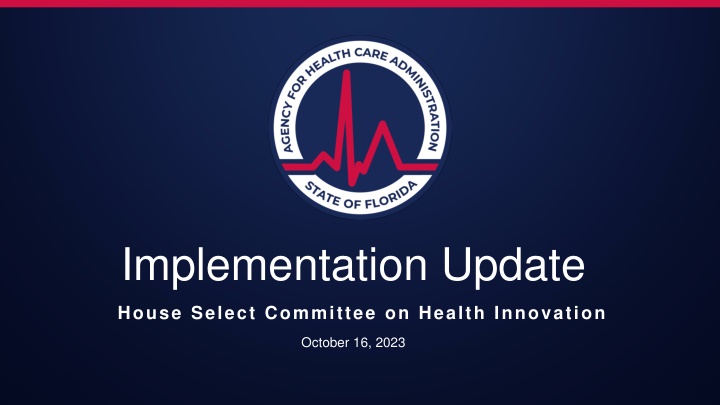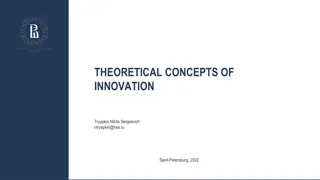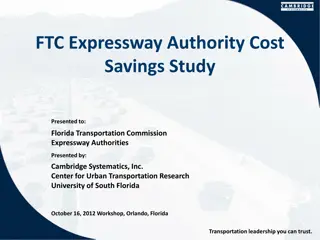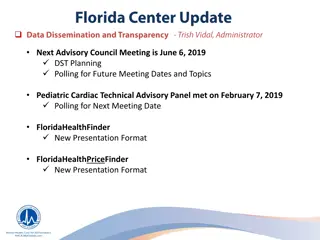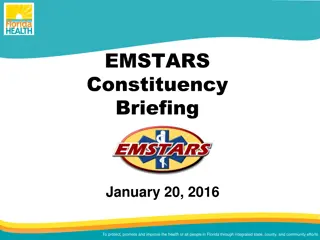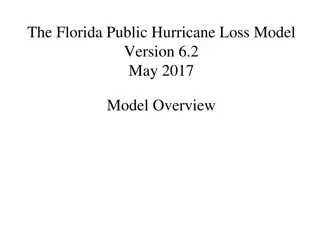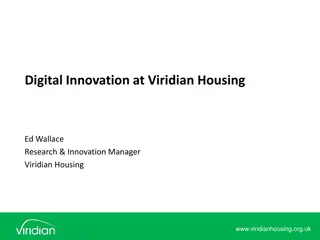Florida Agency on Health Innovation Updates and Initiatives
The Florida Agency on Health Innovation is focused on improving healthcare for Floridians through various programs and initiatives. They manage the Florida KidCare Program, oversee Medicaid coverage updates, and focus on promoting transparency, cost-effectiveness, and high-quality care. Recent legislative changes and agency objectives reflect their commitment to better health outcomes for all residents.
Download Presentation

Please find below an Image/Link to download the presentation.
The content on the website is provided AS IS for your information and personal use only. It may not be sold, licensed, or shared on other websites without obtaining consent from the author.If you encounter any issues during the download, it is possible that the publisher has removed the file from their server.
You are allowed to download the files provided on this website for personal or commercial use, subject to the condition that they are used lawfully. All files are the property of their respective owners.
The content on the website is provided AS IS for your information and personal use only. It may not be sold, licensed, or shared on other websites without obtaining consent from the author.
E N D
Presentation Transcript
Implementation Update House Select Committee on Health Innovation October 16, 2023
Agency Overview MISSION Better Health Care for all Floridians CORE FUNCTIONS - State s Chief Health Policy and Planning Entity - Administering the Florida Medicaid Program - Licensure and Regulation of nearly 50,000 health care facilities We leverage technology to support these core functions and all agency operations. 2 2
Agency Objectives ONE AHCA We are one agency, one team. COST EFFECTIVE We leverage Florida s buying power to deliver high quality care at the lowest cost to taxpayers. TRANSPARENT We support initiatives that promote transparency and empower consumers to make well informed healthcare decisions. HIGH QUALITY We emphasize quality in all that we do to improve health outcomes, always putting the individual first. 3 3
Implementation Updates HB 121 - Florida KidCare Program Eligibility (2023) HB 967 - Medicaid Coverage of Continuous Glucose Monitors (2023) SB 2510 - Pilot Program for Individuals with Developmental Disabilities (2023) Statewide Medicaid Managed Care Procurement Process Update HB 763 - Patient Safety Culture Surveys (2020) 4 4
HB 121 Florida KidCare Program Eligibility During Florida s 2023 Legislative Session, HB 121 passed which made changes to Florida s Children s Health Insurance Program, which is known as CHIP. In Florida, CHIP is part of the Florida KidCare Program Title XIX Title XXI Title XXI Title XXI 5 5
HB 121 Florida KidCare Program Eligibility What is CHIP? The Children s Health Insurance Program (CHIP) provides coverage to uninsured children in families with income that is too high to qualify for Medicaid. CHIP is funded jointly by the federal government and states. In Florida, the program is operated through a partnership. Three state agencies: Agency for Health Care Administration (AHCA) Department of Children and Families (DCF) Department of Health (DOH) Florida Healthy Kids Corporation (FHKC): a non-profit organization 6 6
HB 121 Florida KidCare Program Eligibility What is CHIP? The Agency for Health Care Administration (AHCA) is the lead agency for the Children s Health Insurance Programs (Title XXI CHIP). AHCA works with the federal government to make sure the Florida KidCare program follows all federal laws and rules. Florida Healthy Kids Corporation determines eligibility for CHIP and administers the Healthy Kids program component. 7 7
HB 121 Florida KidCare Program Eligibility HB 121 made the following change: 1 Increases the income eligibility for children in the Children s Health Insurance Program (CHIP) from 200% to 300% of the FPL 2 Increases the number of premium tiers that increase with each level as a percentage of the FPL 3 Effective January 1, 2024 8 8
HB 121 Florida KidCare Program Implementation Steps Status Partner Establish new tiers and premiums Completed Florida Healthy Kids Corporation Federal approval Pending Agency System changes Pending Florida Healthy Kids Corporation and Department of Children and Families System testing Pending Florida Healthy Kids/Agency 9 9
HB 967 - Medicaid Coverage of Continuous Glucose Monitors During Florida s 2023 Legislative Session, HB 967 passed, and the Governor approved, which made changes to Florida Medicaid Coverage of Continuous Glucose Monitors (CGM). Currently, Florida Medicaid Fee For Services (FFS) recipients receive their diabetic supplies through a durable medical equipment (DME) provider. Currently, CGM products, limited to those listed specifically on the DME fee schedule, are available to children only. For drugs and products covered under the Medicaid Pharmacy benefit, multiple products are available, with certain products for which the Agency is able to negotiate a manufacturer rebate being preferred. 10 10
HB 967 - Medicaid Coverage of Continuous Glucose Monitors HB 967 made the following changes: Required the Agency to provide coverage for CGMs for children and adults under the Medicaid pharmacy benefit if: Recipient has a diagnosis of Type 1 or 2 diabetes, gestational diabetes, or any other type of diabetes treated with insulin; and A physician has prescribed insulin to treat the recipient s diabetes and a CGM to assist the recipient and practitioner in managing the recipient s diabetes. Defines Continuous Glucose Monitors (CGM) for the purpose of Medicaid coverage. 11 11
HB 967 - Medicaid Coverage of Continuous Glucose Monitors - Implementation DME and Pharmacy Rules Need to Be Updated: Contract for negotiation of rebates for diabetic supplies at the best price - Notice of Rule Development Workshop held in September 2023 and anticipate final rule by January Create a Preferred Product List (PPL) 12 12
SB 2510- Pilot Program for Individuals with Developmental Disabilities During Florida s 2023 Legislative Session, language passed which made changes to the services available to those in Pre-Enrollment for Florida s iBudget Medicaid waiver. The iBudget Waiver is designed to promote and maintain the health of eligible individuals with developmental disabilities, to provide medically necessary supports and services to delay or prevent institutionalization, and to foster the principles and appreciation of self-determination. 13 13
SB 2510- Pilot Program for Individuals with Developmental Disabilities The Agency for Persons with Disabilities (APD) operates the iBudget waiver and maintains Pre-Enrollment categories. iBudget Pre-Enrollment Receive HCBS services through APD Not eligible to receive HCBS services Receive medical services through Medicaid FFS or Managed Care Enrollees can voluntarily choose to enroll in managed care for their Medicaid services, but are not required. Receive medical services (if Medicaid eligible) through Medicaid FFS or Managed Care Enrollees can voluntarily choose to enroll in managed care for their Medicaid services, but are not required. 14 14
SB 2510- Pilot Program for Individuals with Developmental Disabilities During Florida s 2023 Legislative Session, SB 2510 was passed which included language directing the Agency for Health Care Administration, in collaboration and consultation with the Agency for Persons with Disabilities, to implement a managed care pilot program for individuals with intellectual and developmental disabilities. 15 15
SB 2510- Pilot Program for Individuals with Developmental Disabilities One plan per region chosen by ITN. To be eligible to participate in the pilot program, a plan must have been awarded a contract to provide LTC services, pursuant to s. 409.981 as a result of an invitation to negotiate (ITN). Operate in two Statewide Medicaid Managed Care Regions. Regions D and I D: Hillsborough, Polk, Manatee, Hardee, Highlands I: Miami-Dade, Monroe FY 2023-24 budget provides coverage for up to 600 Medicaid recipients in the iBudget Pre- Enrollment group. Enrollment in the Pilot is voluntary. Provide a comprehensive service package of all services under the Long Term Care (LTC) program, Managed Medical Assistance (MMA) program, and iBudget waiver. 16 16
SB 2510- Pilot Program for Individuals with Developmental Disabilities Steps Status Notes Submit Request for Federal Authority by September 1, 2023 The Agency held the required public comment period from 7/28-8/27/23 and submitted the request for a new 1915c waiver on September 1. Receive approval from Federal CMS In Progress No initial concerns received from CMS Conduct Invitation to Negotiate to select one plan to participate in the Pilot in each region In Progress Anticipate posting early Fall 2023. Submit initial status report to Florida Legislature by December 31, 2023 In Progress Award contracts pursuant to the ITN and begin enrollment by January 31, 2024 In Progress 17 17
Statewide Medicaid Managed Care (SMMC) Re-Procurement SMMC ACTIVITY DATE/TIME Solicitation Issued by Agency April 11, 2023 Deadline for Receipt of Responses October 25, 2023 12:00 p.m. The estimated value of all managed care contracts combined that may result from the ITN is between $120- 150 billion over the anticipated six (6) year term. Public Opening of Responses October 25, 2023 3:00 p.m. Anticipated Posting of Respondent Names for Provider Comment October 27, 2023 Deadline for Receipt of Provider Comments November 9, 2023 5:00 p.m. Anticipated Dates for Negotiations December 4, 2023 through January 26, 2024 Anticipated Posting of Notice of Intent to Award February 23, 2024 18 18
Statewide Medicaid Prepaid Dental Program Re-Procurement DENTAL ACTIVITY DATE/TIME Solicitation Issued by Agency October 6, 2023 Deadline for Receipt of Written Questions Date for Agency Responses to Written Questions Deadline for Receipt of Responses October 27, 2023 2:00 p.m. November 17, 2023 The estimated value of all dental contracts combined that may result from the ITN is between $2 - $3 billion over the anticipated six (6) year term. January 5, 2024 12:00 p.m. January 5, 2024 2:00 p.m. January 8, 2024 Public Opening of Responses Anticipated Posting of Respondent Names for Provider Comment Deadline for Receipt of Provider Comments January 22, 2024 5:00 p.m. (or 10 business days after Respondent Names are Posted) February 5, 2024 through March 1, 2024 March 29, 2024 Anticipated Dates for Negotiations Anticipated Posting of Notice of Intent to Award 19 19
Patient Safety Culture Surveys Patient safety culture is the extent to which the beliefs, values, and norms shared by the staff of a health care organization support and promote patient safety. Patient safety culture surveys are used to measure patient safety culture by determining what is rewarded, supported, expected and accepted in health care organizations as it relates to patient safety. Their intent is to provide health care organizations with an understanding of the safety related perceptions and attitudes of its managers and staff and are used as diagnostic tools to identify areas for improvement. These surveys can also be used to measure organizational conditions that can lead to adverse incidents and patient harm. 20 20
HB 763 - Patient Safety Culture Surveys During Florida s 2020 Legislative Session, HB 763 passed, which required hospitals and Ambulatory Surgery Centers (ASCs) to use the Hospital or ASC Survey on Patient Safety Culture to conduct patient safety culture surveys on facility staff. This made the following changes to Florida Statute. Required the facilities to conduct the survey anonymously to encourage staff employed by or working in the facility to complete the survey. Authorized the facility to contract to administer the survey and to develop an internal action plan to identify survey measures to improve on between surveys. Required AHCA to collect, compile, and publish patient safety culture survey data submitted by the facilities. Required AHCA to customize the surveys to include questions that will generate certain data. 21 21
HB 763 - Patient Safety Culture Surveys In accordance with Section s. 408.05(3)(d)(1), Florida Statutes, the Agency for Health Care Administration: Developed a Patient Safety Culture Survey (PSCS) process to assess the status of patient safety culture in hospitals and ambulatory surgical centers (ASCs); Designed an informational webpage with general information, a system guide, FAQs, forms, and data entry tools to assist with survey data submission; Developed a system application; and Successfully promulgated rule 59A-35.115, Patient Safety Surveys. 22 22
HB 763 - Patient Safety Culture Surveys - Requirements The Agency was tasked with using the Agency for Healthcare Research and Quality s (AHRQ) survey templates and to modify them to include Florida specific questions. AHRQ is the lead federal agency charged with supporting research designed to improve the quality of health care, reduce costs, address patient safety and medical errors, and broaden access to essential services. Although the AHRQ is voluntary, they provide incentives for providers by offering the survey for free and allow for a repository of past results to allow facilities to determine progress. Other survey tools are available for use by providers. 23 23
HB 763 - Patient Safety Culture Surveys - Additional Agency Requirements The Agency s responsibilities are to define the survey format, create a reporting intake method, define the data submission specifications in rule, compile survey data, and publish a report. The Agency s survey included two additional questions to gauge the likelihood of staff to seek care for themselves or their family within the surveying facility. 24 24
HB 763 - Patient Safety Culture Surveys - Reporting Areas This survey requirement is for 306 licensed hospitals and 479 licensed ASCs in the state of Florida and covers these topic areas: 25 25
HB 763 - Patient Safety Culture Surveys - Reporting Details Registration begins January 2025. Initial reporting period will be open from June 1, 2025 August 31, 2025. During rulemaking, hospitals requested to report at the same time as ASCs. This aligns with their federal patient safety reporting timelines for hospitals and ASCs. The survey tool is available on-line and can be administered any time before the required reporting periods. 26 26
